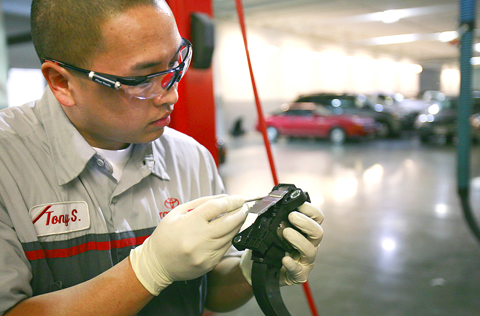Toyota is investigating whether its Lexus luxury hybrids have the same braking problem as the newest Prius model, although it has not received any customer complaints, a spokeswoman said yesterday.
Toyota said on Thursday it had redesigned the anti-lock braking system (ABS) for the new Prius and would soon announce safety measures for those already on the road.
It said when the ABS was in operation, there was a small delay switching from regenerative braking — which captures the energy of the car’s motion to recharge the battery — to the hydraulic brake.

PHOTO: REUTERS
Other Lexus hybrids, such as the HS250h sedan, use the same brake system as the Prius, as does the Toyota Sai luxury hybrid sedan.
“We are checking protectively they do not have the same problem as the Prius,” Toyota spokeswoman Mieko Iwasaki said, adding that the firm has not received any reports of brake trouble with Lexus vehicles.
The Nikkei Shimbun said that Toyota had also decided to recall an estimated 270,000 Prius cars in Japan and the US to fix the brake problem.
Toyota, which overtook General Motors in 2008 as the top-selling automaker, has been bedeviled by a series of safety issues that have raised questions about whether it sacrificed its legendary quality to become world No. 1.
The company is pulling about 8 million vehicles worldwide — roughly its entire global sales figure last year — to fix a separate problem with accelerator pedals that are slow to spring back or that stick to floor mats.
The gas pedal problems have been blamed for several accidents.

GAINING STEAM: The scheme initially failed to gather much attention, with only 188 cards issued in its first year, but gained popularity amid the COVID-19 pandemic Applications for the Employment Gold Card have increased in the past few years, with the card having been issued to a total of 13,191 people from 101 countries since its introduction in 2018, the National Development Council (NDC) said yesterday. Those who have received the card have included celebrities, such as former NBA star Dwight Howard and Australian-South Korean cheerleader Dahye Lee, the NDC said. The four-in-one Employment Gold Card combines a work permit, resident visa, Alien Resident Certificate (ARC) and re-entry permit. It was first introduced in February 2018 through the Act Governing Recruitment and Employment of Foreign Professionals (外國專業人才延攬及雇用法),

RESILIENCE: Deepening bilateral cooperation would extend the peace sustained over the 45 years since the Taiwan Relations Act, Greene said Taiwan-US relations are built on deep economic ties and shared values, American Institute in Taiwan (AIT) Director Raymond Greene said yesterday, adding that strengthening supply chain security in critical industries, enhancing societal resilience through cooperation and deepening partnerships are key to ensuring peace and stability for Taiwan in the years ahead. Greene made the remarks at the National Security Youth Forum, organized by National Taiwan University’s National Security and Strategy Studies Institution in Taipei. In his address in Mandarin Chinese, Greene said the Taiwan-US relationship is built on deep economic ties and shared interests, and grows stronger through the enduring friendship between

The Ministry of Transportation and Communications yesterday said that it would redesign the written portion of the driver’s license exam to make it more rigorous. “We hope that the exam can assess drivers’ understanding of traffic rules, particularly those who take the driver’s license test for the first time. In the past, drivers only needed to cram a book of test questions to pass the written exam,” Minister of Transportation and Communications Chen Shih-kai (陳世凱) told a news conference at the Taoyuan Motor Vehicle Office. “In the future, they would not be able to pass the test unless they study traffic regulations

‘COMING MENACINGLY’: The CDC advised wearing a mask when visiting hospitals or long-term care centers, on public transportation and in crowded indoor venues Hospital visits for COVID-19 last week increased by 113 percent to 41,402, the Centers for Disease Control (CDC) said yesterday, as it encouraged people to wear a mask in three public settings to prevent infection. CDC Epidemic Intelligence Center Deputy Director Lee Chia-lin (李佳琳) said weekly hospital visits for COVID-19 have been increasing for seven consecutive weeks, and 102 severe COVID-19 cases and 19 deaths were confirmed last week, both the highest weekly numbers this year. CDC physician Lee Tsung-han (李宗翰) said the youngest person hospitalized due to the disease this year was reported last week, a one-month-old baby, who does not